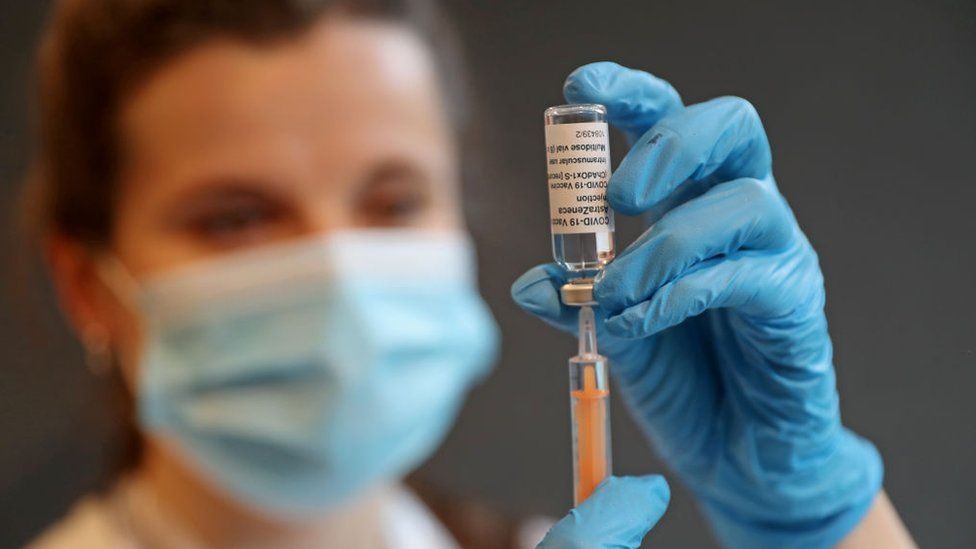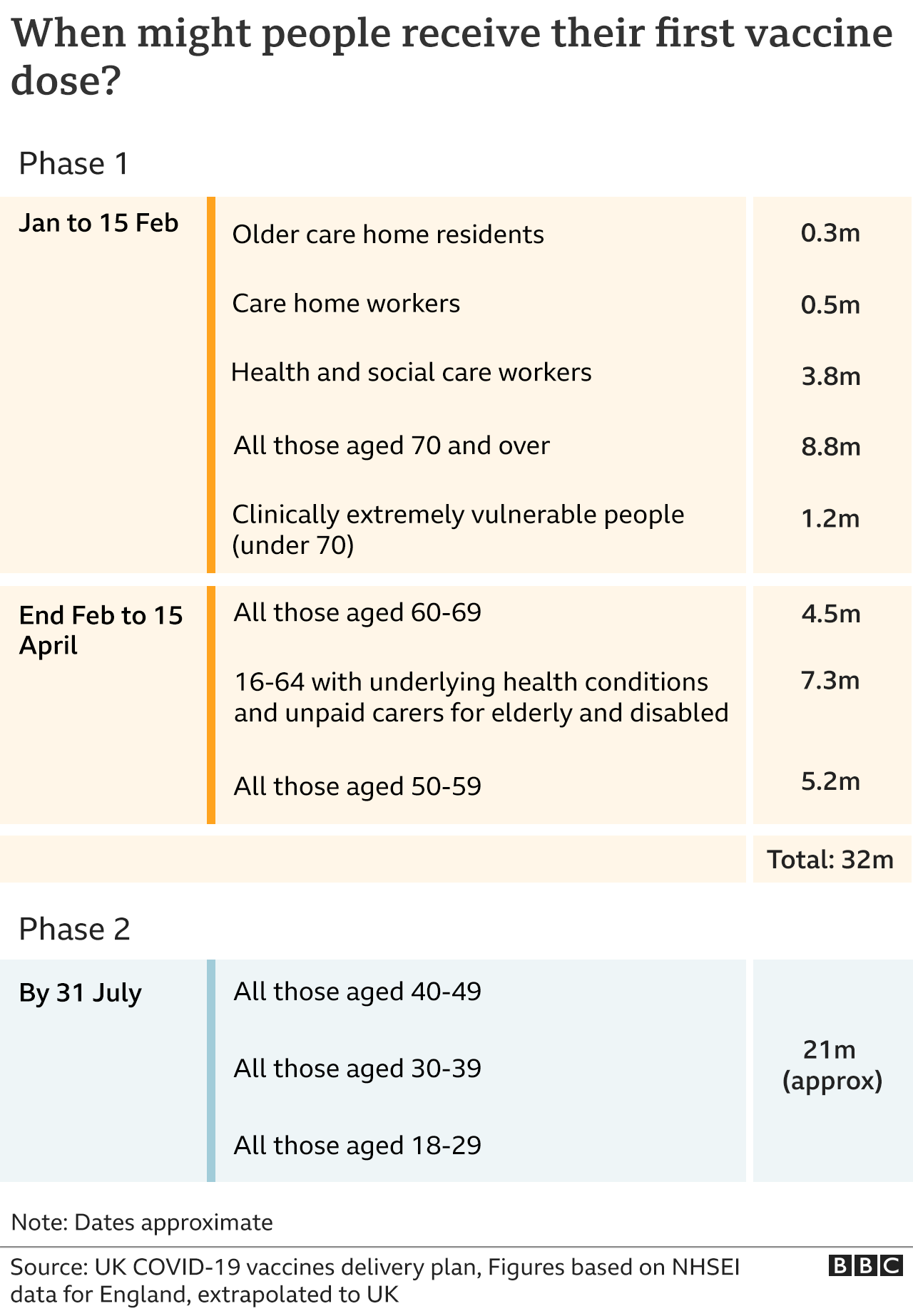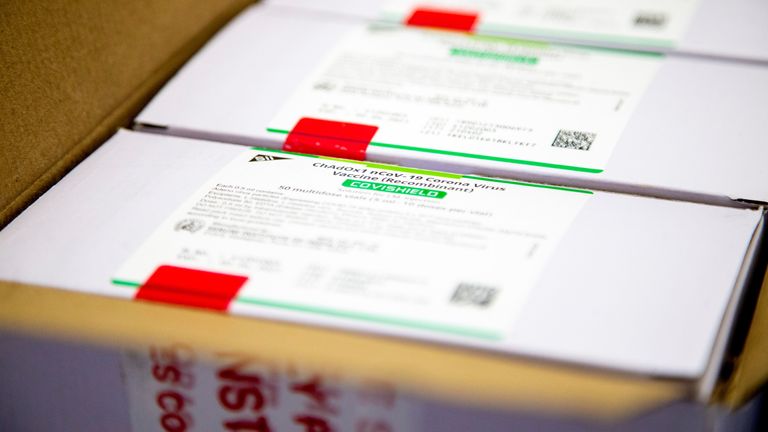The prime minister has said there will be "no change" to England's lockdown easing roadmap, despite the NHS warning of a "significant reduction" in the supply of coronavirus vaccines next month.
Speaking at a Downing Street news conference, Boris Johnson said the country's "progress along the road to freedom continues unchecked".
"We remain on track to reclaim the things we love, to see our families and friends again, to return to our local pubs, our gyms and sports facilities and of course our shops," he added.
Live COVID updates from the UK and around the world
A need to retest more than one-and-a-half million COVID-19 vaccine doses - as well as delays to doses arriving from India - will lead to a cut in the supply of jabs next month.
Addressing this at the latest Number 10 briefing, Mr Johnson said: "We've always said in a vaccination programme of this pace and scale some interruptions in supply are inevitable and it is true that in the short-term we're receiving fewer vaccines than we had planned for a week ago."
He added: "We will receive slightly fewer vaccines in April than in March, but that is still more than we received in February."
The PM said the Indian government had not stopped doses from being shipped to Britain, putting the delay down to "various technical reasons".
Nonetheless, Mr Johnson said "the supply we do have will still enable us to hit the targets we have set" for vaccines.
The UK has set a target of offering everyone in the top nine priority groups - all over 50s and everyone with an underlying health condition - a jab by the middle of April.
Meanwhile, the plan is to vaccinate all UK adults by the end of July.
Mr Johnson revealed at the news conference that he would be getting an Oxford-AstraZeneca jab on Friday.
More than a dozen EU countries have suspended its use after reports of some people suffering blood clots after being vaccinated.
But the Medicines and Healthcare products Regulatory Agency (MHRA), the UK's medicines regulator, has said that any link between the Oxford-AstraZeneca COVID-19 jab and blood clots is unproven and the benefits of the vaccine outweigh any risks.
The World Health Organisation has said that the benefits of having the vaccine outweigh any risks, while the European Medicines Agency said on Thursday that the jab was "safe and effective" to use.
"The Oxford jab is safe and the Pfizer jab is safe - the thing that isn't safe is catching COVID, which is why it is so important we all get our jabs as soon as our turn comes," the PM said.
The MHRA said it has received five reports of a specific brain blood clot in individuals who have had the Oxford-AstraZeneca vaccine, although no causal link has been made with the jab.
The five were men aged between 19 and 59 who experienced a clot together with low blood platelet count. One of them has since died.
The MHRA is investigating the reports, but stressed the events were "extremely rare" and they could have been caused by coronavirus itself.
It is not known at this stage whether the individuals had underlying health conditions.
The MHRA said the number of cases translated to a less than one in a million chance of suffering this type of clot among those who have had the jab.
In contrast, the risk of dying from coronavirus aged 40 to 49 was one in 1,000.
MHRA chief executive Dr June Raine told the Downing Street news conference that the regulator was constantly monitoring the safety of vaccines to help identify any new side effects.
She said the MHRA had undertaken a "rigorous scientific review of all the available data with regard to suspected blood clots".
She said this review, alongside the assessment of independent scientists in the Commission on Human Medicines, showed "there is no difference that blood clots in veins are occurring more than would be expected in the absence of vaccination for either vaccine".
Dr Raine added: "The public can have every confidence in the thoroughness of our review."
Professor Chris Whitty, England's chief medical officer, told the same briefing: "This is a very significant disease that is very common, with a very effective vaccine - two vaccines in the case of AZ and Pfizer.
"Real issues that we always have to think about with all drugs, but they are so much smaller than the benefits to getting the vaccines."
He said there were "anecdotal reports" of small numbers of people not turning up for appointments in the wake of the headlines surrounding the Oxford-AstraZeneca jab.
But Professor Whitty said there had not been a pronounced effect on uptake, declaring: "The general public is, as always, sensible and steady on this. They understand this is a dangerous disease."
Facing MPs earlier on Thursday to field questions about the vaccine rollout, Health Secretary Matt Hancock said the UK was "currently right now in the middle of some bumper weeks of supply".
It was announced on Wednesday that the UK has now administered more than 25 million first doses.
However, the health secretary admitted that supply in April will be "tighter than this month and we have a huge number of second doses to deliver".
Around 12 million people will require their second jabs next month.
Mr Hancock is insistent that the reduction in supply will not affect the targets for the UK's vaccine rollout.
https://news.google.com/__i/rss/rd/articles/CBMiiQFodHRwczovL25ld3Muc2t5LmNvbS9zdG9yeS9jb3ZpZC0xOS1wbS1zYXlzLW5vLWNoYW5nZS10by1uZXh0LXN0ZXBzLW9mLXJvYWRtYXAtb3V0LW9mLWxvY2tkb3duLWFzLXVrLWZhY2VzLWN1dC1pbi12YWNjaW5lLXN1cHBseS0xMjI0OTg3M9IBjQFodHRwczovL25ld3Muc2t5LmNvbS9zdG9yeS9hbXAvY292aWQtMTktcG0tc2F5cy1uby1jaGFuZ2UtdG8tbmV4dC1zdGVwcy1vZi1yb2FkbWFwLW91dC1vZi1sb2NrZG93bi1hcy11ay1mYWNlcy1jdXQtaW4tdmFjY2luZS1zdXBwbHktMTIyNDk4NzM?oc=5
2021-03-18 17:48:45Z
52781438959839
















